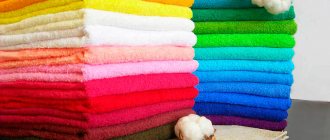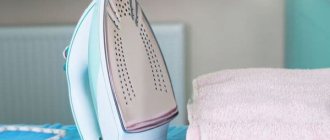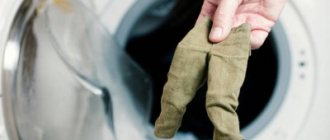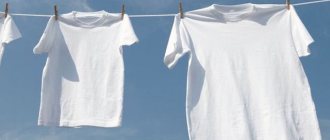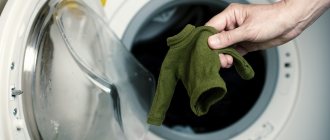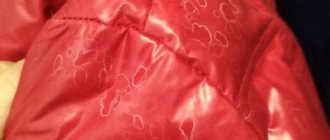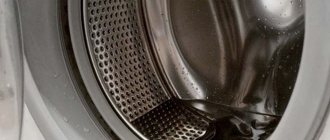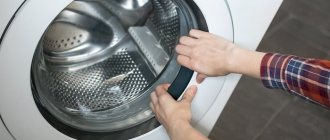Comfort in the house is created by various little things. A soft towel can continue the relaxing effect after a shower or bath.
But over time, the products lose their original appearance. There are several reasons for this.
There are simple, cost-effective ways to preserve the quality of new towels for a long time and even revive old products.
What to do if towels become hard after washing in the washing machine and why does this happen? How can I make them soft and fluffy again?
Why did the products lose their softness after being processed in the washing machine?
When buying a new towel, any housewife dreams of maintaining its softness for a long period. However, the product loses its original appearance after each wash. There are five main reasons that lead to hard towels:
Poor quality of tap water . Unfortunately, most regions of Russia use too hard water. Calcium and magnesium salts clog fabric fibers, which negatively affects the appearance of products.- Inappropriate remedy . Particles of inexpensive dry powders get stuck in the canvas, making it rougher. The longer the pile of a towel, the more detergent remains in the fabric, which makes it stiffer.
- Wrong mode . Each product must be washed, taking into account the properties of the fabric from which it is made. Each type of fiber has its own washing mode (manual or automatic, temperature, rinse, spin).
- Errors in product care . This includes violation of the rules of drying, ironing, and storing towels.
- Low quality fabric . Unfortunately, modern industry is designed to produce inexpensive goods that quickly become unusable.
To enjoy the softness of your towels for a long time, you need to clearly identify the cause of the hardness and eliminate it. In each case, either one provoking factor or all five are possible.
Reasons why towels become hard
The fabric can become rough and unpleasant to the touch both when washed by machine and when washed by hand. True, it is much easier to ruin a towel when washing in a machine - after all, manual processing cleans the material more carefully, and your hands will not allow you to use too hot water and low-quality powders.
The quality of terry items deteriorates for several reasons.
- Hard water. Unfortunately, in most regions of our country, the water contains a significant amount of lime salts. Settled in the fibers of the fabric, they deteriorate the quality of any material. Hard water needs to be softened. We'll tell you how to do this below.
- The quality of the detergent. In this regard, terry is a rather capricious material that does not like powders. Therefore, it is best to resort to liquid laundry detergents.
- Incorrect washing mode - too hot water, poor rinsing, spin at high speeds.
- Mishandling. Some housewives manage to boil terry towels or iron them without a steamer. This is strictly not recommended.
So how do you wash terry clothes without deteriorating their original properties?
Fabric softener and liquid laundry detergent will prevent towels from deteriorating
How to make them soft and fluffy and return them to their original appearance?
How to soften a towel and other clothes after washing? There are simple, cost-effective ways:
| Method name | How to use |
| Salt | You can use table or sea food. Salt is added to the washing machine along with the powder in the amount of 3 tbsp. l. When washing by hand, salt is used during rinsing at the rate of 1 tbsp. l per liter of water. Towels are thoroughly rinsed in the solution. |
| Soda | Regular baking soda can also restore softness to towels. After washing, the products are soaked for 1 hour in a solution of water and soda (3 tablespoons per 1 liter). If machine washing is used, then add soda to the conditioner compartment and set the additional rinse mode. |
| Vinegar | The product is added to the conditioner container for machine washing in the amount of 0.5 cups. For manual use, pour 150-200 ml of vinegar into the water. |
| Vinegar with soda | Both products can be used simultaneously. It is permissible to pour vinegar into the air conditioner compartment, and pour soda directly into the tank. |
| Soaking after washing | The products are poured in cold water and kept for 12 hours. After the procedure, rinse, gently squeeze and dry. This method will help remove excess powder from the fabric. |
| Ammonia | You can soak towels after washing using ammonia at the rate of 1 tsp. per liter of water. The procedure is carried out for 2–3 hours, after which the products are rinsed and dried. Ammonia gives softness and gets rid of old stains. |
| Rinse aid | You can prepare the product yourself or buy it ready-made. On the shelves of hardware stores there is a huge assortment of products for making linen fresh and soft. The choice is limited by taste preferences and financial capabilities. To prepare the mouthwash yourself, you need to mix half a glass of vinegar and baking soda and dilute it in 1 liter of water. If desired, add a few drops of your favorite essential oil for fragrance. All ingredients are mixed and poured into a suitable bottle. Use about 200 ml of product per wash. |
| Wash balls | Tennis or other balls are placed in the drum of a washing machine. During washing, the balls rotate and fluff up the lint of the fabric, which allows it to remain soft. |
The more reasons that cause hard towels, the more difficult it will be to make them soft. You may have to use several methods and not just once, but regularly.
To keep towels soft, you need to choose detergents without chlorine and phosphates.
Hard laundry after washing - what to do?
After purchasing terry towels, every housewife is faced with the problem of losing their initial softness during use. It often happens that their fabric becomes rough after the first wash, which is very unpleasant. After washing, things must retain their original texture; for this it is necessary to properly care for them. Washing terry towels is a complex and time-consuming process, even with an automatic machine. The main reasons why laundry becomes rough after washing are:
- programming the washing machine for a large number of revolutions during washing and spinning. This leads to the terry fibers being abraded and damaged;
- sedimentation of impurities in a product made from water. It could be various salts or minerals that make the water hard. Therefore, after washing in such water, the material naturally becomes coarser;
- choosing a very high water temperature, which leads to the sticking of the fibers;
- low-quality laundry detergents. After using them, the towels are no longer fluffy;
- drying bath accessories near a fireplace that radiates heat.
Water hardness is the main reason for loss of softness
Tap water has the property of hardness - this means that it contains a large amount of dissolved mineral salts, which, when washed, settle on the surface of the clothes. Hard water causes the towel to lose its elasticity, which prevents maximum moisture absorption. There are several ways to make water soft:
- Installing a filter that will not allow certain salt compounds to pass through. Most often they are installed to purify water from magnesium and potassium salts. The resulting water is of better quality, and the towels in this case will be less susceptible to adverse effects.
- Special detergents for softening water in a washing machine. These products are developed using a special technology that helps eliminate the sedimentation of impurities. Water softeners are available in powder and liquid form. In general, they practically do not differ in their characteristics, the only thing is that liquid products last much longer.
Washing process to preserve the original appearance of the towel
After washing in the machine, the towel should not become rough, so follow a few tips to help avoid this problem. Because otherwise, it will be more difficult to return hard linen to its original appearance after washing.
The first step when washing heavily soiled towels is to soak them. This will keep the fabric structure soft.
In order to most effectively remove stains and preserve the appearance of the towel, you need to make a special soaking solution. To do this you will need:
- 20 milliliters of ordinary table vinegar;
- liter of water per 20 ml of vinegar. When increasing the amount of solution, maintain the same ratio.
Tips for washing soft towels
Linen will be soft after washing if you apply practical tips that will preserve the structure of the products. There are many tips on how to properly process terry products. Some of the best are:
- Placing towels in special protective bags that resist direct impact of the drum walls on the product. These devices can be made of canvas or mesh. During washing, the fibers of the fabric will not rub off on the drum, which means that its softness will last for quite a long time.
- Do not wash soft terry towels with items that shed heavily. This is due, first of all, to the loss of color of the product and its hair structure.
- Under no circumstances should you wash towels with various items that contain plastic buttons or iron fasteners. If you wash them together, you will definitely damage the lint. When washing, you should take this factor into account, since otherwise the product may be completely damaged.
- Selection of washing powder and rinse aid. There are many companies that produce high-quality products for washing and subsequent rinsing, which allow you to maintain the softness of the fabric after each wash.
- Do not wash wet towels. When they are soaked, there is a possibility of a musty smell that may not disappear after washing.
- Give preference to economical liquid washing powders and rinse aids.
To protect towels from the negative effects of water, use expensive products. Their main advantage is that they do not become clogged with fibers and are easy to rinse out.
How to properly wash, dry and store so that the products are pleasant to the touch?
To keep your towels soft for a long time, you must follow the rules of washing, drying and storing. A tag with instructions for caring for the product is attached to any product.
Typically, the information contains advice on the following processes:
- washing;
- bleaching;
- drying;
- spin;
- ironing;
- professional care.
Towels should be stored separately from other linen in a ventilated closet.
It is not recommended to put contaminated items in a common basket , since they absorb unpleasant odors from other clothes and are then difficult to get rid of.
Homemade conditioner recipe for softness
You can make your own air conditioner at home. To do this, you will need a medium-sized vessel and three components:
- baking soda;
- 9% vinegar;
- water;
- essential oil
A glass of water and soda are added to the prepared vessel, and six glasses of vinegar are poured on top. Do not be alarmed when the soda and vinegar enter into a chemical reaction, allow it to complete and add 6 more glasses of water. To add aroma to your homemade conditioner, you can add 20 drops of essential oil.
When the product is completely ready, it must be poured into a tightly closed bottle. To make the product soft, it is recommended to use half a glass of home conditioner with each wash.
Features of the softening procedure depending on the material
The following main types of fabric are used to make towels:
- Terry. Such items should be washed and rinsed in large quantities of water. It is better to wash with liquid detergents at a temperature no higher than 600. Spin at 400–500 rpm. Ironing is not recommended. To add softness, it is possible to use all known methods.
- Cotton. Universal towels. Widely used for body and kitchen needs. The products can withstand high temperatures and spinning, but shrink and become very wrinkled. Softness is returned in all the ways described above.
- Bamboo. These towels remain soft even after 500 washes. Wash well at 300 without using bleaches or softeners. Spin at low speed is recommended.
- Velours. Washable at temperatures no higher than 400. Retains softness with gentle spinning and ironing with a warm iron. Some manufacturers do not recommend ironing products.
- Microfiber. It is of artificial origin. Products made from this fabric are soft and pleasant to the touch. They can be washed both by hand and in the machine. Do not use bleaches, softeners, or conditioners. No ironing required.
- Linen. Hard to the touch. Used as kitchen hand towels. White ones can be boiled, and colored ones can be washed at a temperature not exceeding 600. Iron with a well-heated iron.
Manufacturers may add a certain percentage of synthetic fibers to the main types of fabric, so recommendations for caring for products made from the same fabric differ.
Useful tips
keep your towels soft :
When washing items made from long pile, you need to set the extra rinse function, which will allow you to more thoroughly remove detergent residues.- Load the drum 60–70%, since a large number of items prevents thorough washing and rinsing.
- Do not wash at temperatures above 600. Too high temperatures make the fabric rough.
- Choose silicone-based rinses or those designed for children's clothes. Such products provide softness to products for a long time.
- After washing the product, shake thoroughly and dry vertically in a well-ventilated area or in the air. Direct sunlight and drying on radiators make towels hard.
- Products with long pile should not be boiled.
- It is better not to iron or carry out the procedure with steam.
- It is useful to use a special laundry bag, which will protect long-pile towels from the metal drum of the washing machine.
Rinse cycle
Most often, laundry becomes hard because of the powder. In this case, you can switch to liquid detergents. But it’s best to run a rinse cycle without clothes before washing to clean the machine from any remaining powder. And another rinse cycle needs to be started after washing.
Sometimes the washing machine starts to smell bad. This problem occurs not only with older equipment. Even a new machine can develop an odor if microorganisms begin to develop in it. There are several ways to prevent this.
